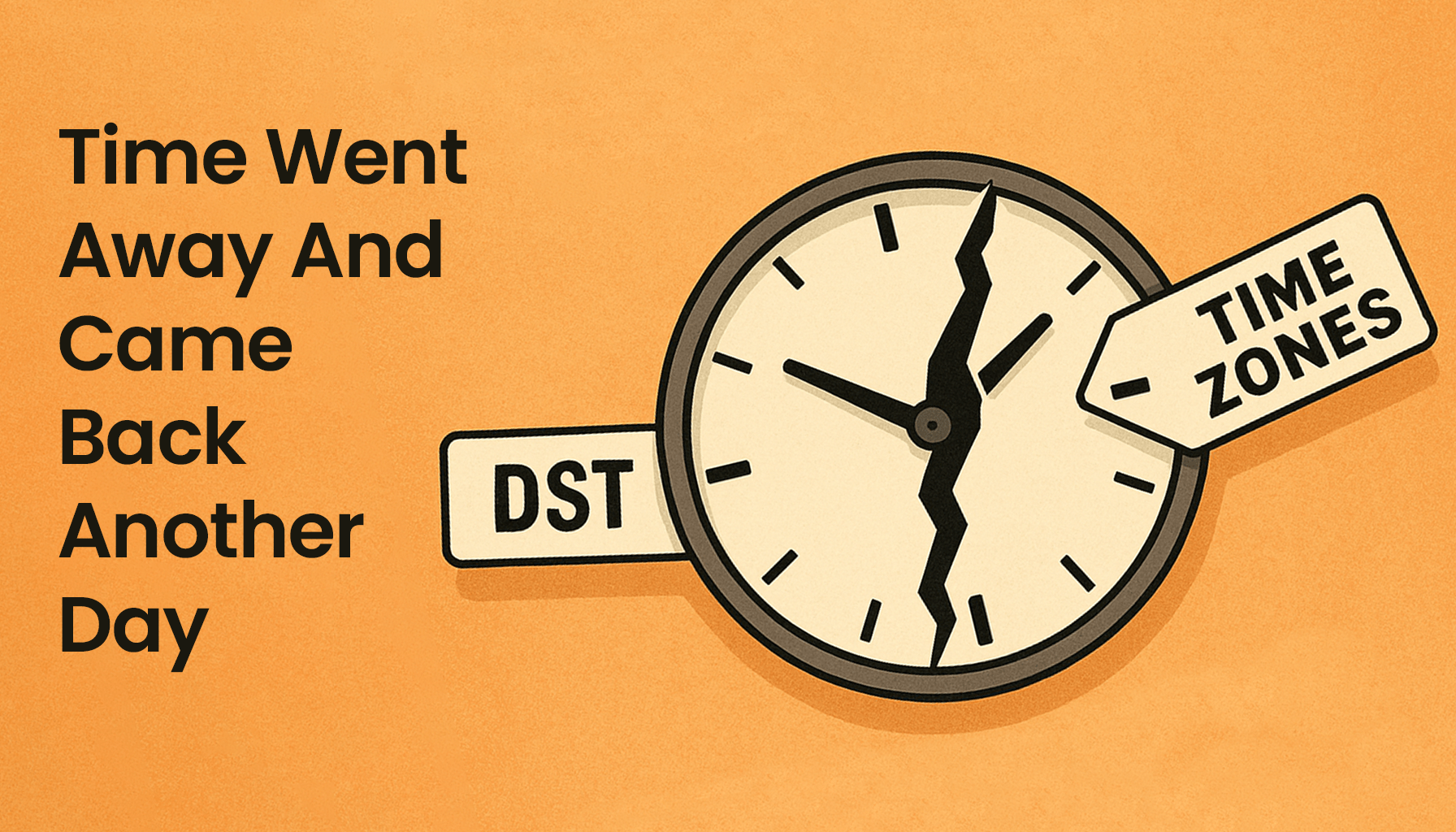Time Went Away and Came Back Another Day

How Daylight Saving and Time Zones Break Development (and Sanity)
There’s a certain kind of chaos that only hits twice a year. No alarms. No visible smoke. Just an eerie silence in your Google Calendar and a creeping realization that nobody showed up to the 9:00 AM standup. And that’s when it hits you.
Time changed.
Daylight Saving Time is like someone sneaking into your house and moving all your furniture around. They say it’s “better” now, but you’re just confused and can’t find anything. For tech teams, this means meetings go haywire, schedules get messed up, and suddenly “tomorrow” means something totally different.
Time Changes: Nature’s Patch Update
Your backend dev is an hour ahead, your designer is stuck in yesterday, and the PM? The PM is still trying to figure out why Jira thinks “tomorrow” means three time zones ago.
And it’s not just the one-hour shuffle. It’s the fact that not everyone changes time at the same time. The EU and the US can’t agree on whether it’s spring yet. Some countries don’t change time at all because they’ve either given up or reached enlightenment. Meanwhile, your multinational team is pinging each other in five languages, trying to decide when “end of day” actually is.
Your Product Hates Time Zones Too
Even your product is tired.
APIs break. Scheduled notifications go rogue. Your beautiful automated email system—once a clockwork masterpiece—is now firing birthday emails to users on the wrong date.
“Happy Birthday, Maxine!” you say.
Maxine writes back: “Thanks, but it’s in July.”
Timezones in code are like that one legacy bug you swore you patched six sprints ago… but it’s still lurking in production, quietly breaking things when you’re not looking. You don’t see the problem until it’s too late. One minute everything’s fine, and the next your app is gaslighting users into believing their appointments are in the past. Or worse—in 1970.
Humans Weren’t Built for This
It gets worse with user feedback. Time-sensitive features that worked yesterday are suddenly lagging, skipping, or time traveling. Your code is fine. The logs are fine. But nothing makes sense because some OS decided to auto-adjust the system clock without asking.
And let’s talk about remote collaboration for a moment. Nothing brings people together like timezone math. You haven’t lived until you’ve watched three adults try to figure out if 3 PM CET is before or after 10 AM EST, while someone in Asia politely asks, “Can we move this to a reasonable hour for me?”
Hacks, Workarounds, and Ritual Sacrifices
There are solutions, of course—most of which involve never trusting anything that says “Local Time.”
Use UTC.
Live in UTC.
Dream in UTC.
If you need to show local times, don’t do the math yourself. Let libraries do it, even if they sometimes betray you. Keep a world clock widget open at all times. Not because it helps, but because it makes you feel slightly in control.
Time Is a Lie, But Deadlines Are Real
At some point, you realize that time, like software, is just a bunch of decisions someone made a long time ago and nobody wants to touch now. It’s legacy infrastructure for reality.
And here’s the real kicker: no one ever accounts for time in planning. We assume time is constant. But it’s not. Time slips, slides, warps—and every team has at least one horror story where “end of day” turned out to mean “start of panic.”
Final Tip: Say the Zone. Every Time.
So what can we do? Build some padding into your schedules. Don’t deploy on days when clocks move (seriously, just don’t).
Communicate time with the zone. Never say, “let’s meet at 4.” Say “let’s meet at 4 PM CET, which is 10 AM EST, 7:30 PM IST, and no, I don’t know what time it is in Queensland right now.”
Oh, and remind your users: just because your app didn’t forget their scheduled call doesn’t mean their phone didn’t. Because in the world of time zones and DST, your app is guilty until proven innocent.
In the end, time isn’t real. But your calendar-induced nervous breakdown? That’s very, very real.